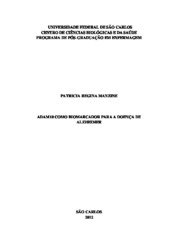ADAM10 como biomarcador para a doença de Alzheimer
Resumo
Alzheimer's disease (AD) is the most common cause of dementia in people over 65 years. Platelet studies with ADAM10 have shown to decrease its expression in AD patients. The association between cognitive testing and molecular biomarkers such as levels of platelet ADAM10 protein can be important tools for the accurate and early diagnosis of AD. The aim of this research was to investigate the relationship between the Mini-Mental State Examination - MMSE and the Clinical Dementia Rating - CDR with the ADAM10 expression in two groups of elderly. 30 subjects with AD were compared with 25 matched controls by sex, age and education. All ethical considerations were observed. Individual evaluations were carried out and applied the CDR and MMSE, and then performed the collection of biological material of the elderly. The techniques SDS-PAGE and Western blotting were used to quantify the ADAM10 content in platelets. After collecting the data, they were analyzed using statistical methods of comparison, correlation, association, logistic regression and diagnostic accuracy. The results show that the ratio ADAM10/_-actin was reduced in elderly patients with AD and that this reduction is intensified with the progression of the disease. MMSE and CDR have significant correlations with the values of ratio ADAM10/_-actin, this being the only statistically significant variable (p = 0.01) to increase the probability of occurrence of AD. The cutoff value < 0.4212 in ROC curve captures 70% sensitivity and specificity of 80.77% for the presence of AD according to the ratio ADAM10/_-actin. Therefore, the ratio ADAM10/_-actin seems to be a relevant biomarker for AD. The results bring important contributions to an accurate diagnosis of Alzheimer's disease from the perspective of ADAM10 as a biomarker for this disease. The results are preliminary but encouraging.
